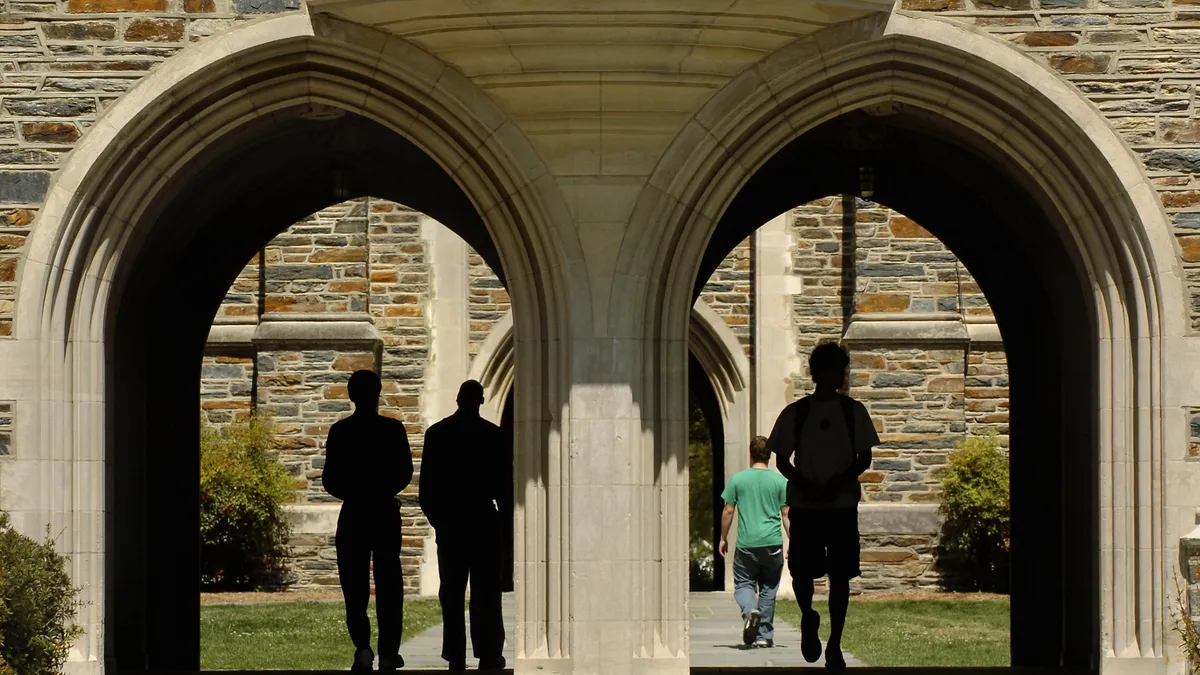Dive Brief:
- Duke University recently agreed to pay $19 million to settle a class-action antitrust lawsuit that alleged the institution had an illegal agreement with the University of North Carolina at Chapel Hill not to poach each other's nonmedical faculty members.
- Lucia Binotti, a Spanish professor at UNC-Chapel Hill, sued Duke last year on behalf of faculty members at the two institutions. She alleged that the agreement resulted in lower faculty pay and violated federal and state antitrust laws.
- The settlement covers nonmedical faculty who worked at the two schools between Oct. 1, 2001 and Feb. 5, 2018. Regular rank faculty are expected to receive average gross compensation of $3,207 per person, while nonregular rank faculty are expected to receive $208 per person, according to court documents.
Dive Insight:
The lawsuit alleged that Duke and UNC-Chapel Hill had an illegal agreement since at least the 1970s to suppress competition for each other's faculty members. The deal was meant to subdue employee pay, as competition between the two institutions for employees would have driven up compensation, according to the complaint.
It also alleged that the two universities worked together to set similar compensation levels for different faculty jobs. The agreement was particularly harmful, the lawsuit alleged, because the universities are within 14 miles of each other and have similar research support and prestige.
Faculty members seeking a school with similar academic quality would have to move to another location and incur significant costs, according to the complaint. "None of these costs would occur if a faculty member switched between Duke and UNC," it stated.
A federal judge approved the settlement in August. The formula for allocating the settlement funds gives weight to faculty members who worked relatively longer at one of the two universities or who had higher pay, as they would have been harmed more than others by the no-poach agreement, according to court documents.
Leftover funds will be given to the American Antitrust Institute, a nonprofit that promotes competition and antitrust enforcement.
In court documents earlier this year, Binotti's lawyers described the results in the settlement agreement as "excellent." If the case had gone to trial, the statute of limitations would have barred damages for claims before 2016 and faculty members would have had to convince a jury of the no-poach agreement.
Duke did not immediately respond to Higher Ed Dive's request for comment Tuesday. UNC-Chapel Hill declined to comment.
The case isn't the first to bring antitrust allegations against the two schools. In 2015, a Duke radiology professor sued the university, saying a no-poach agreement led to her being turned down from a job at UNC Health.
That lawsuit alleged that the agreement only affected medical faculty members. Duke settled the case in 2018 by agreeing to put $54.5 million into a settlement fund for affected employees.
But while that case was playing out, "evidence of a much broader understanding between Duke and UNC came to light," according to Binotti's class-action complaint. "Prior to that date, members of the class alleged here had no reason to know that the No-Poach Understanding extended beyond the two medical schools."
The previous lawsuit revealed the schools secretly communicated with one another to keep the no-poach agreement in place when one of their employees applied to the other institution, Binotti alleged.














